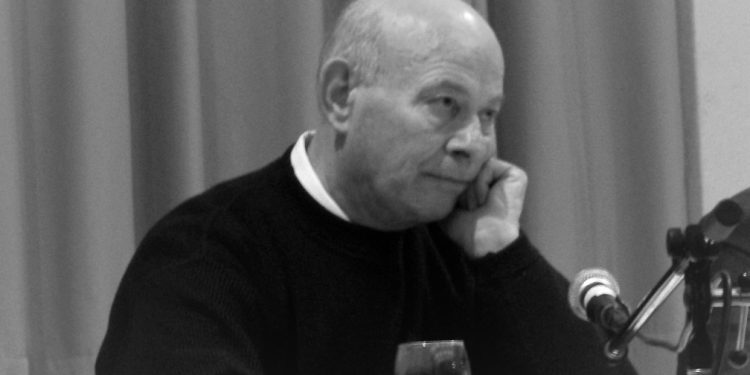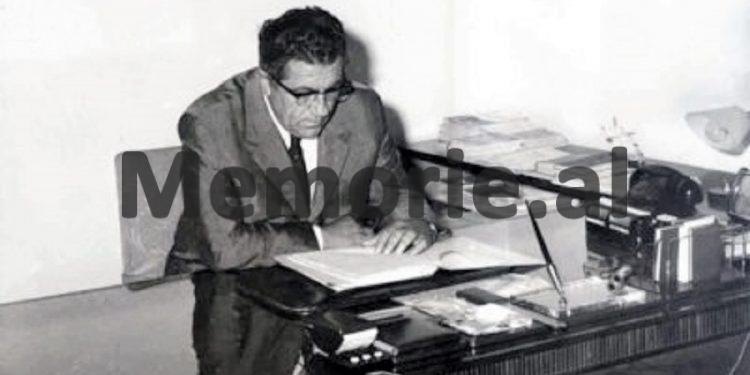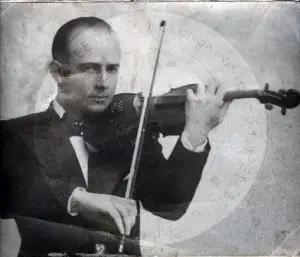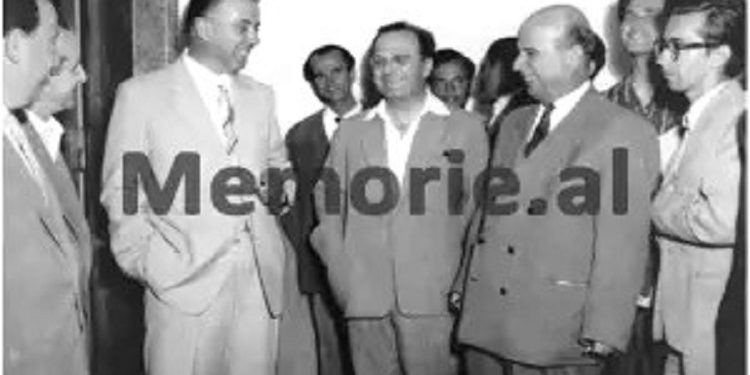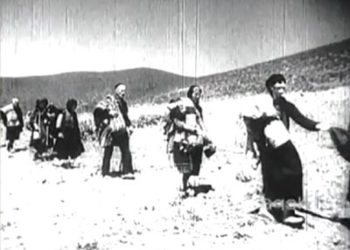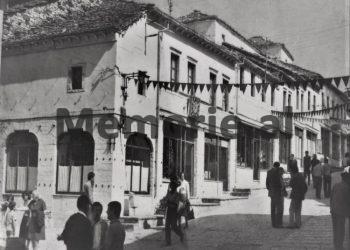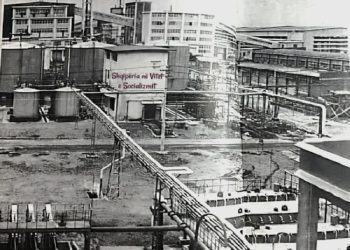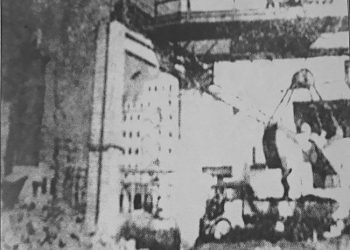From Fatos Kongoli
Memorie.al / Almost fifty years have passed. Even before the literary and artistic fury had subsided, another “drama” began to be staged. The author and director was the same person, Enver Hoxha. It is often said that he was paranoid, which is why, throughout his life, from beginning to end, besides the “class enemies,” he killed and purged all his closest friends and associates one after another. He may have been paranoid, but that would be a mitigating circumstance. He was simply a cold-blooded and methodical criminal, one of the cruelest. I don’t recall who I first heard the downfall of Beqir Balluku from, in the form of a whispered rumor.
I was in Elbasan, and late one night, hoping to find my father at home, I went to the city post office and called home. My question, “How are you?” he correctly deciphered. “Don’t worry,” he told me, “we are fine; we’ll talk when you come.” This led me to understand that something had happened. By the following Saturday, when I usually returned home, I learned an approximate truth: for several days, the Minister of Defense had not been going to the office, he was locked in, and this was nothing more than a house arrest.
My father confirmed this to me when I returned to Tirana. He did not know the details. To show me he felt calm, he invited me to go for a beer at the Officers’ House garden, which was located then where it is today. I did not understand why he invited me to go precisely there. This was the phase when things were still spoken of in whispers, until a somewhat surreal event circulated. During one of the nights of house arrest, Balluku supposedly felt ill, asked for help from the ‘leadership’ clinic, and they, aware of the situation, did not respond.
The sick man was supposedly forced to call the city’s emergency service, and they, in turn, surprised, if unaware of the internal affairs, immediately sent four doctors. A variant also circulated that, after the refusal of the leadership clinic, Balluku had appealed to Enver Hoxha, and assistance was made possible through the latter’s intervention, which could even be believed; the executioner had not finished with the victim; he needed him alive until the moment came to cut off his head.
My father’s tragedy was “consumed” in this setting. By the word “tragedy,” I do not mean the expulsion from the party. His true tragedy was disappointment. A bitter, inconsolable disappointment. In the days of abandonment by everyone, the only person he sometimes talked to was me. In one of those rare conversations, truthfully, he did not want to show himself defeated before me; he complained. And he attempted an apology for himself.
The essence of this apology was this: he had always felt different from the vast majority of Albanian communists, especially those at the top. He differed from the vast majority because, not being a proletarian or a poor peasant, he had sided with the revolution – that’s how he put it – not driven by the Marxist motive, “the proletarian has nothing to lose but his chains.” “I,” he explained to me, “never had chains; I never suffered for a piece of bread.”
While he felt different from those who led, because his choice was not motivated by careerist aims for power. He had been an idealist, inclined towards revolutionary ideas, even when studying in Italy, between the two powerful currents of the era – Antonio Gramsci’s communism and Duce’s fascism – with an allergic disdain for the latter. He had not become a communist because of X or Y, who were at the top, much less had he taken up arms for X or Y; he recognized these “merits” to no one.
The concluding argument: he had risked a lot without gaining anything. In the end, he lost everything. “I was a teacher at the ‘Normal School’ of Elbasan,” he explained, “with a high salary, and I never had it again. I had just married your mother, from a family, if not the richest, among the richest in the city, wealth that went to the dogs. I went to the mountains, along with a hundred ‘Normal School students,’ when your mother was pregnant, and when I left, I didn’t know if I would return. Fate wished that I would return, not hale and hearty, as they say, but sick, tuberculous, after an encounter with death that didn’t want to take me then.”
My father’s disappointment began with the ease and cynicism with which they manipulated him and discarded him like a squeezed lemon. It was sealed, gradually, when his eyes were finally opened, and he understood the shattering truth: all his life he had chased a false ideal. His illusory “revolutionary” structure had collapsed. It took him some time to come down to earth; it never occurred to him that they might discard him. He even displayed this self-confidence with a kind of arrogance at the first meeting of the ‘sect’ cell – the words from the basic party organization meeting disgust me at this moment – where a colleague at the Institute of Folklore, or a delegate from “above,” had asked him for explanations about his friendship with Beqir Balluku.
My father, as he told me, had reacted with the words: “I was expecting this question, just as the hunter waits for the rabbit to emerge on the path. It was a friendship of mine, with an old friend, with a member of the Politburo, and let anyone here come out and tell me they would not want such a friendship, and I would spit in their face!” My late father was a courageous man, he didn’t know fear, and at the same time, he was very naive. When I, without hiding my concern – I was now part of the same “sect” – told him that such an answer was neither necessary nor appropriate, he contradicted me, calling me a coward.
Perhaps, but in the given circumstance, the word “courage” sounded absurd. Immediately after that reaction, the situation heated up, and he had to face a more direct question: had there been political discussions between them, and what were they? This question followed and tortured my father until the end. He suffered greatly, especially when he became convinced that things were not as simple as he remembered. And he did his best to avoid expulsion. In this context belongs a letter in the form of a self-criticism, which he addressed to Enver Hoxha, against his wishes, at the insistence of others, including me.
He did not want to address him. “He knows me,” he would say, “I have nothing to write to him!” But, finally, he surrendered. Now I regret it. That letter, instead of helping him, harmed him, especially his dignity. With everyone he condemned or beheaded, the dictator played a wicked game. He compelled them in various ways to “unfold,” to “open up” to the party, and the wretched ones, as revealed by various “materials” of the time that have been made public, easily fell into the trap.
Vainly hoping they would save what they could, they addressed their “Zeus” with letters of self-criticism, where they displayed remorse, devotion, and took responsibility for imaginary faults, just to touch that monster somehow. And the monster was not touched; on the contrary, he attacked them even more furiously, exploiting precisely the “self-criticisms” of the unfortunates, drafted in moments of severe spiritual crisis. In such a state of crisis, my father also drafted his “self-criticism” letter.
I traveled especially from Elbasan to Tirana, no less confused, but with a difference. My father suffered from disappointment, from the collapse of all illusions. My confusion was simple, material, stemming from the fear of consequences. He sat down to formulate the “self-criticism,” but he had lost his ability to write to the extent that he couldn’t put down a single line. Pale as wax, he told me: “I’m not in a state to write, you write it, or let’s forget it!” Of course, he didn’t understand why he should demean himself, why he should do “self-criticism,” display “remorse”!
We agreed to build the letter upon the acceptance of three “mistakes.” First, “the lack of revolutionary vigilance towards the traitor Beqir Balluku,” an accusation they had frequently repeated to him in the analyses made. Second, a somewhat delayed reflection on the “dangerous hostile activity of Beqir Balluku,” and with this, any hasty initial reaction of his to colleagues’ questions for explanations about his friendship with the traitor was explained. Third, perhaps he had, without realizing it, taken on the role of a “troublemaker” (or “party thrower” – gaztor).
He included this last point, which was ridiculous and completely out of place, in the “self-criticism,” simply to admit something concrete, to show that he was “reflecting,” “deepening.” In truth, the former minister liked the folk songs of Central Albania; I was present on all occasions when he came to our house and quietly sang a song, and my father would accompany him with the violin. Or he would sing Isuf Myzyri’s songs himself. It was based on these family evenings, where very little alcohol was consumed because Balluku did not drink, that the low slander was raised and circulated, according to which my father organized parties (ahengje) for Beqir Balluku.
The “parties” were precisely these, and he was forced to “deepen,” “reflect,” and arrive at the term “gaztor,” which was later basely exploited against him. Finally, he pointed out his loyalty to the party line, etc., etc. But he rejected what was stubbornly demanded: in no case had he held political discussions with Beqir Balluku, which was called a lack of sincerity, and he paid dearly for it: he was expelled from the party. The “story” does not end here; it concluded with another unimaginable treachery. One evening, while talking on the phone from Elbasan, Lili, my wife, told me she had surprising good news. My father’s request for the review of the expulsion measure had been deemed fair by the Revision Commission, and the penalty had been reduced to just a reprimand in his biography.
The most intense part: the Secretary of the Institute’s organization had seen the decision with his own eyes. Rarely could I have felt so happy. The readmission meeting was supposed to take place in mid-December (1974). On the appointed date, I was at home, and euphoria reigned there; preparations had been made to celebrate it as a great event: our anxiety and fears would end. We were eagerly awaiting my father’s return from the District Party Committee until the doorbell rang. With a troubled face, he stood for a few moments, without coming inside, fixing me with his gaze as if to ask for forgiveness.
He was dressed in his best clothes: a dark blue suit, a dark grey “Gub” coat, a grey, dark republike hat, a white shirt, and a red tie. “They rejected me again,” he said muffledly. And he went straight to his room. Mourning fell over the house. When he was expelled from the party some time ago, we were shaken, but we expected it. This time we experienced the terror of a catastrophe, as if the building had collapsed, and we were trapped under the rubble. After changing, he came to the kitchen, where we were sitting stunned. He greeted and thanked the relatives gathered to celebrate. “I’m sorry,” he told them. “Now look after your affairs, mine are seen to.” And they silently left, one after another.
We never learned what had happened and why everything had been overturned. Mother made him a coffee, and he managed to tell me something. “I understood as soon as I entered,” he said, “when the others sat with their heads bowed, not daring to look me in the eye, and only M. M., with a soul blacker than his face, started with the old refrain, attacking me from the beginning with the question of what political discussions I had held with Beqir Balluku. ‘Why the devil,’ I thought, ‘do I have a family?’ ‘If you prove that I had political discussions with Beqir Balluku, may grass cover my house,’ I told him. While he retorted: ‘Go away, you are insincere and a drunkard. The Party does not need insincere people and drunkards’!”
This, then, was the final bill handed to that man, from whose mouth I had heard only propaganda about the “Party line” all my life. Without an ounce of manners, with the criminal arrogance typical of the most disgusting common people. Until his death, paradoxically, my father insisted on not accepting that the evil had not come from the one he described as “with a soul blacker than his face,” but from the head-eater, the “supreme chief,” before whom, as he sometimes expressed himself, everyone “shat blood,” including the one “with a soul blacker than his face.”
Until he died, he also did not want to accept something else: in his youth, still a student in Italy, by embracing communist ideas, evens those of Antonio Gramsci; simply because Duce’s Blackshirts and the Duce himself aroused his allergy, he had made the gravest mistake of his life. Besides these alternatives, in the homeland of Giuseppe Verdi, to mention just one of my father’s great family members, there were other alternatives, those that saved Italy after the war from a plague as dangerous as fascism. We used to debate about these subjects, and he would get upset. He would sometimes lose his logic.
For example, I remember a clash one night, which, like many others now, I regret. That night, I don’t know how the conversation came up, but I told him: “If during the war, the peasants, to whom you promised the ‘golden spoon,’ had known what condition you would reduce them to, not only would they not have sheltered you and kept you fed, not only would they not have given you their sons to fight, but they would have shot you.” My father turned pale. He could barely breathe and hit the table with his fist. “Fatos,” he said, “you are a Ballist, and they did well not to accept you into the Party.”
And for some time, he did not speak to me. The greatest fear, and not just mine, in those days was a possible arrest of my father. Now this might sound ridiculous; my father was an artist, not a general, but it didn’t sound that way then, and only those who have experienced it can understand what that panic was like. I remember that we had a bunch of illustrated French magazines at home – fashion, advertisements, cinema, etc. – donated by our neighbor upstairs, a French diplomat.
Once, when I was working at the “Drita” newspaper, some children had broken the taillights of his car, which he parked on the street in front of the building, and the diplomat came to complain to us. Both my father and I were at home, and he told the foreigner that he was sorry, he couldn’t do anything, and children were children. The Frenchman liked the conversation and took the liberty of visiting us with his wife, uninvited, of course – who would dare to invite them? – and we received them, and this happened twice, and both times my father did not fail to inform the “relevant authorities.”
Since that time, we had a number of French magazines, donated by the neighbor. The panic that enveloped us those days was so strong that, fearing a search, we remembered the magazines; their presence at home could complicate things for us even more. So, we had to burn them, and that’s what we did. It took my mother several hours to burn those voluminous magazines one by one in the stove, and she suffered severe poisoning with vomiting from the gases their burning released, and she became so ill that we had to call the emergency services. Our fear of a possible arrest of my father, however absurd, was not greatly contrary to reality, precisely because this was an absurd reality.
When I returned to Elbasan, a cousin of mine, my uncle’s son, named Frederik, who was my age, came looking for me in the dormitory late one evening. The late Frederik – he died a few years ago – seemed cut to the core. “The word here is that my uncle has been imprisoned,” he told me, “what’s the matter?” (In Elbasan, the word dajë is used for both the mother’s and the father’s brother). I got dressed and went out. According to the rumor, my father had been arrested that afternoon. If it is true that in moments of strong shocks, a person can turn grey, during the walk from the dormitory to the city post office, I should have turned grey, for the hair I had left before it fell out.
I did not turn grey, so I do not believe in the truth of this legend. On the other end of the line, my mother answered. I asked her, “How are you?” and she replied, “What can we be?!” and I, alarmed, asked if my father was home, and she replied, “Yes, he is here, in his room,” and when she said she was going to call him, I pleaded, “Please, let him be!” Frederik suggested we go to the old Turizmi (hotel/bar) to have a drink. I agreed; on the contrary. Although I had not turned grey during the walk from the dormitory to the city post office, that night I would not have been able to get through without expressing a feeling that would never leave me for the rest of my life: the fear of tomorrow.
Despite the fact that for the time being, they were treating me well, calming me with the expression, “every ram hangs by its own legs,” a suffocating anxiety gripped my throat that night. To escape it, I had to drink. I’ve said it, alcohol has always attracted me. But until then, I drank for pleasure. I had even gotten drunk for sport, to appear “strong,” and suffered the consequences. The instances of drinking to intoxication had not been driven by an internal need. I did not know what it means to feel the need to get drunk. That night, I felt the need to get drunk. I drank so much that Frederik insisted I not go to the dormitory; he proposed I sleep at his place, and I obeyed.
I first began to feel the need for intoxication, as a means to escape anxious states, in those circumstances. I also experienced a qualitative transformation for the first time, a sudden change; I saw myself transformed into another “material.” It is like a dreamlike nightmare that continues even after you wake up. Viewed in retrospect, everything comes with the neutral appearance of an experience, destructive and constructive, full of dangers, but undoubtedly an experience, incomparable, on the path of knowledge.
From the moment you open your eyes, until the evening, wherever you are, at every step you take, a voice, sometimes contemptuous, sometimes with cynical rejoicing, proclaims: “Here is how the world turns! People now avoid you; that’s what the rules of the game require. You know these rules, you have applied them to others; don’t complain now that you are experiencing them yourself. From now on, you, too, enter the unhygienic category of this society. Frankly put, now it’s your turn to become an object of the class struggle.” Memorie.al




